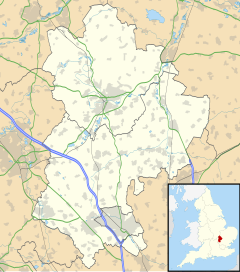Sandy, Bedfordshire
| Sandy | |
|---|---|
 Market Square, Sandy |
|
| Sandy shown within Bedfordshire | |
| Population | 10,887 (2001) 11,657 (2011 Census) |
| OS grid reference | TL1649 |
| Civil parish |
|
| Unitary authority | |
| Ceremonial county | |
| Region | |
| Country | England |
| Sovereign state | United Kingdom |
| Post town | SANDY |
| Postcode district | SG19 |
| Dialling code | 01767 |
| Police | Bedfordshire |
| Fire | Bedfordshire and Luton |
| Ambulance | East of England |
| EU Parliament | East of England |
| UK Parliament | |
Sandy is a small market town and civil parish in Bedfordshire, England. It is frequently referred to as "the high mark of Bedfordshire" It lies between Cambridge and Bedford, on the A1 road from London to Edinburgh. The area is dominated by a range of low hills known as the Sand Hills. The River Ivel runs through the town. The Anglican church is dedicated to St Swithun.
Sandy is probably best known today as the headquarters of the RSPB. The Society moved to the Lodge, on the outskirts of the town, in 1961. The Shuttleworth Collection is also nearby, around 2 miles (3 km) south west of Sandy. The Riddy is a flood meadow on the Ivel and a local nature reserve.
An archaeological dig in May 2006 revealed that the area may have been settled earlier than 250 BC. However Sandy was a Roman settlement and was probably an important trading centre and staging post in the Roman era. An ancient hill fort, now heavily wooded and traditionally known as "Caesar's Camp" although more commonly called "the sand hills" or "the lookout", still overlooks the town.
Sandy is referred to in the Domesday Book, as Sandeia, a derivation from the Old English Sandieg, meaning a sand-island. In 1086 Sandy was listed in the Domesday Book as being held by Eudo Fitzhubert, who is likely to have been the tenant. He was probably also known as Eudo Dapifer, who was a high steward for William the Conqueror, and based in Colchester Castle.
...
Wikipedia

